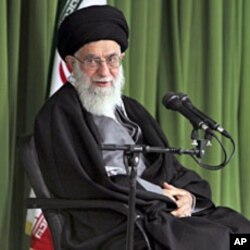Iran is crushing dissent leading up to its March 2 parliamentary elections and has launched a “cyber army” to block Internet and social media communication, according to Amnesty International.
“What we’ve seen is an intensification of patterns of human rights violations” Suzanne Nossel, executive director of Amnesty USA, told VOA’s Persian News Network. She said the Tehran government has cracked down on journalists, NGOs, think tanks and opposition figures.
Nossel said Tehran has put a trained corps of cyber police in Internet cafes to enforce the crackdown, making it very difficult for anyone to document or relate to the world any abuses - as they did in 2009 when massive protests were brutally squashed by the government.
Opposition activists, reformists, and students at the time used Facebook, Twitter, and mobile phone videos to alert the world to the bloody crackdown, a technique also used in uprisings across the Arabic-speaking world in the past year.
“They’ve seen people use their cell phones, their computers, the Internet to connect with one another, to organize and mobilize, and I think this decision to focus so heavily on creating a cyber police force, and putting such intense restrictions on access to the Internet and the ability of people to connect is a direct response to that,” Nossel said.
Iran's protests were a reaction to the re-election of President Mahmoud Ahmadinejad in a vote many Iranians said was fraudulent.
Many reformists believed opposition leader Mir Hossein Mousavi would have been the winner in an accurate count. Tens of thousands took to the streets in what became known as the Green Movement, because demonstrators adopted the color green, a symbol for Mousavi's campaign.
The demonstrations led to clashes with police and pro-government militia. One person who died in the protests was a young woman, Neda Agha-Soltan, whose shooting death was captured on cell phone videos that reverberated around the world.
Khamenei: Questioning election results a crime
In August of 2009, Mr. Ahmadinejad demanded that opposition leaders be prosecuted for what he said was their role in masterminding the unrest. The protests eventually faded due to the crackdown and in October, supreme leader Ayatollah Ali Khamenei said questioning the results of the election was a crime.
Pro-reform political parties have been banned, and opposition leaders Mousavi and Mehdi Karroubi have been under house arrest for the last year. Nossel believes the “repression of political opponents, placing them under house arrest, is just a deliberate effort to shore up the regime.”
Iranian authorities have been urging the security forces to be vigilant against “enemy threats” leading up to this year's vote.
“The enemy's propaganda machines and the media of arrogant circles have begun an extensive effort so that the assembly election is without splendor," Ayatollah Khamenei said recently. "But all should know that the people's participation in the elections will take the country forward... an election full of excitement will be a major blow to the enemy."














